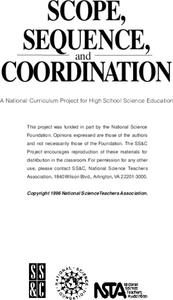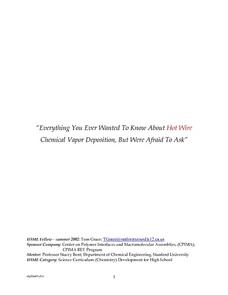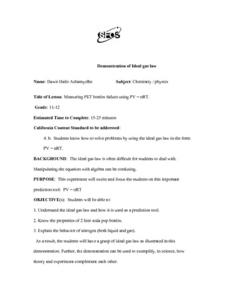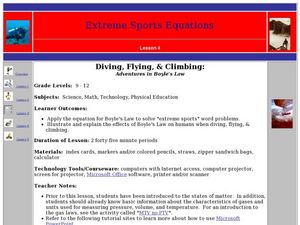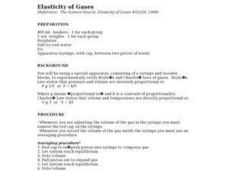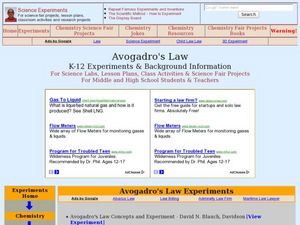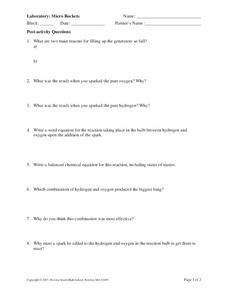Curated OER
Gas Law Investigation
Investigators collect the carbon dioxide produced when an antacid tablet is activated and identify what alteration produced the most gas. They also collect the gas in a buret in order to practice precision. Then they choose between two...
Curated OER
Gas Laws
A series of attention-grabbing demonstrations and lab activities is outlined in this document. Through them, chemistry kids appreciate the behavior of gases. Inflate balloons, marshmallows, and toothpaste tubes without adding air! Use...
Curated OER
Everything You Ever Wanted To Know About Hot Wire Chemical Vapor Deposition, But Were Afraid To Ask
To wrap up your year of general chemistry, have lab groups compete in a tot wire chemical vapor deposition (HWCVD) competition. With their foundation in chemical nomenclature, stoichiometry, and gas laws, each group completes several...
Curated OER
Gas Pressure, Volume, and Temperature
Physical science learners conduct a simple experiment using the heat of their hands to affect the fluid pressure. They place a balloon atop a freezing cold bottle and observe what occurs as it warms up. Both activities demonstrate how...
Curated OER
Demonstration of Ideal Gas Law
You know that liquid nitrogen turns into a gas at room temperature. Place some in a two-liter bottle for a physics demonstration of the ideal gas law. Beware, however; this is a dangerous demonstration! Not to mention that you may not...
Curated OER
Blast Off
In this physical science exploration, small groups place a piece of antacid tablet into a film canister and step back to time how long it takes for the top to pop. They repeat the activity, altering either the amount or temperature of...
Curated OER
#24 How Much Air Is In Foamed Polystyrene Products?
Students are challenged to come up with a good estimate of the amount of air in foamed polystyrene products. They use this gas evolution experiment and as such have students measure the gas generated when foamed polystyrene is degassed...
Curated OER
Outta Gas
Students explore practical problems that are related to scuba diving. For this oxygen lesson students complete a lab activity.
Virginia Department of Education
Partial Pressure
At some point, everyone has been under pressure—even Dalton! Explore Dalton's law of partial pressures with young chemists as they measure the volume of air extracted from a sample compared to its original volume. Class...
Curated OER
Graham's Laws: Diffusion and Effusion of Gases
Learners conduct a series of experiments to explore Graham's law. In this chemistry lesson, students differentiate effusion and diffusion. They perform calculations using Boyle's, Henry's, Charles' and Graham's Laws.
Curated OER
Chemical and Physical Changes
Eighth graders investigate different gas behaviors. In this chemistry lesson, 8th graders describe how changing volume and temperature affect gas particles motion. They collect data and make a generalization about these variables'...
Curated OER
Gas Laws
Eighth graders use lab work and software to collect and analyze pressure and temperature data in order to illustrate the relationship between the temperature and pressure of a gas at a constant volume. They conduct a lab and organize...
Curated OER
Lesson 5: Boyle's Law
Students participate in a lab to verify Boyle's Law using applied force (weight) to do work on a closed isolated system of air. "Elasticity of Gases Apparatus, BASIX" from Sargent-Welch is the syringe apparatus used to measure volume...
Cornell University
Chemical Reactions
Investigate the Law of Conservation of Mass through a lab exploration. Individuals combine materials to initiate chemical reactions. They monitor for signs of reactions and measure the masses before and after the reactions for...
Curated OER
Understanding Behavior of Gases
If you want your young chemists to fully grasp the behavior of gases, here is an all-inclusive lesson plan. It provides handouts of detailed instructions for three laboratory activities, assessment reccomendations, and a list of...
Curated OER
Diving, Flying, & Climbing
Students explore Boyle's Law. In this Boyle's Law lesson, students complete problems involving Boyle's Law. They examine the effects of Boyle's Law upon the human body. Students use the Internet to complete a lab activity.
Curated OER
The Conservation Of Mass (The Mass Of Gas)
Students gain an understanding of matter in all of its phases. In this science lesson plan, students further their knowledge of the laws of conservation of mass, the loss in mass can be accounted for, when the gas is allowed to escape...
Curated OER
Sitting on Nails-Boyle's Law
Students experience pressure as a force per unit area in this experiment with a board of nails. In this physics lesson, students discover Boyle's law as they perform experiments with pressure.
Curated OER
Behavior and Properties of Gases
Students convert Celsius to Kelvin temperature. Students conduct three lab experiments, gas law simulations using Internet applets, lectures and demonstrations. The Laws included are Boyle's, Charles, Combined Gas, Ideal Gas, and Gram's...
Curated OER
Elasticity of Gases
Students investigate gas laws and apply them in experimental conditions. Using an apparatus composed of a syringe and wooden blocks, they experimentally verify Boyle's and Charles' laws of gases.
Curated OER
Avogadro's Law
Pupils study Avogadro's law and what it means in science. In this gaseous lesson students complete an Avogadro's law experiment.
Cornell University
Predicting Chemical Reactions
Prove the Law of Conservation of Mass through a lab investigation. A well-designed lesson asks groups to combine materials and monitor indicators for chemical reactions. Measuring the mass of the reactants and products allows individuals...
Curated OER
Laboratory: Micro Rockets
If you know how to employ the exothermic reaction between hydrogen gas and oxygen gas to make a miniature rocket, then this worksheet is a fabulous lab sheet for your chemistry charges. First, they observe a spark in pure oxygen and one...
Curated OER
The Great Gas Race
Fourth graders improve their understanding of Graham's Law by using properties of gases to evaluate the rate of effusion of two compounds as they vaporize. They engage in a lab which elevates their understanding of the properties of gases.

